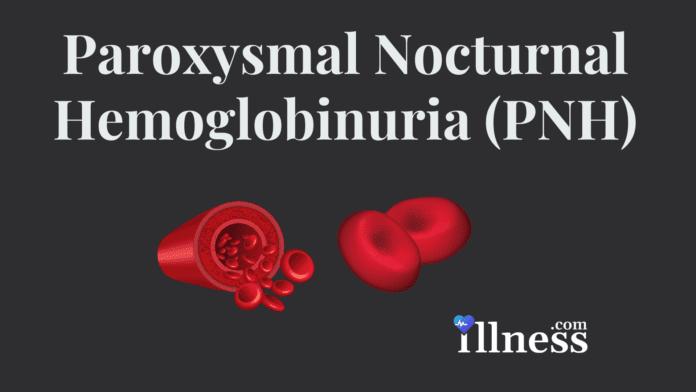Overview Of Paroxysmal Nocturnal Hemoglobinuria (PNH)
Paroxysmal Nocturnal Hemoglobinuria (PNH) is a rare disease in which red blood cells break down earlier than normal.
Commonly Associated With
PNH
Causes Of Paroxysmal Nocturnal Hemoglobinuria (PNH)
People with this disease have blood cells that are missing a gene called PIG-A. This gene allows a substance called glycosyl-phosphatidylinositol (GPI) to help certain proteins stick to cells.
Without PIG-A, important proteins cannot connect to the cell surface and protect the cell from substances in the blood called complement. As a result, red blood cells break down too early. The red cells leak hemoglobin into the blood, which can pass into the urine. This can happen at any time but is more likely to occur during the night or early morning.
The disease can affect people of any age. It may be associated with aplastic anemia, myelodysplastic syndrome, or acute myelogenous leukemia.
Risk factors, except for prior aplastic anemia, are not known.
Symptoms Of Paroxysmal Nocturnal Hemoglobinuria (PNH)
Symptoms may include:
- Abdominal pain
- Back pain
- Blood clots may form in some people
- Dark urine comes and goes
- Easy bruising or bleeding
- Headache
- Shortness of breath
- Weakness, fatigue
- Pallor
- Chest pain
- Difficulty swallowing
Exams & Tests
Red and white blood cell counts and platelet counts may be low.
Red or brown urine signals the breakdown of red blood cells and that hemoglobin is being released into the body’s circulation and eventually into the urine.
Tests that may be done to diagnose this condition include:
- Complete blood count (CBC)
- Coombs test
- Flow cytometry to measure certain proteins
- Ham (acid hemolysin) test
- Serum hemoglobin and haptoglobin
- Sucrose hemolysis test
- Urinalysis
- Urine hemosiderin, urobilinogen, hemoglobin
- LDH test
- Reticulocyte count
Treatment Of Paroxysmal Nocturnal Hemoglobinuria (PNH)
Steroids or other medicines that suppress the immune system may help slow the breakdown of red blood cells. Blood transfusions may be needed. Supplemental iron and folic acid are provided. Blood thinners may also be needed to prevent clots from forming.
Soliris (eculizumab) is a drug used to treat PNH. It blocks the breakdown of red blood cells.
Bone marrow transplantation can cure this disease. It may also stop the risk of developing PNH in people with aplastic anemia.
All people with PNH should receive vaccinations against certain types of bacteria to prevent infection. Ask your health care provider which ones are right for you.



